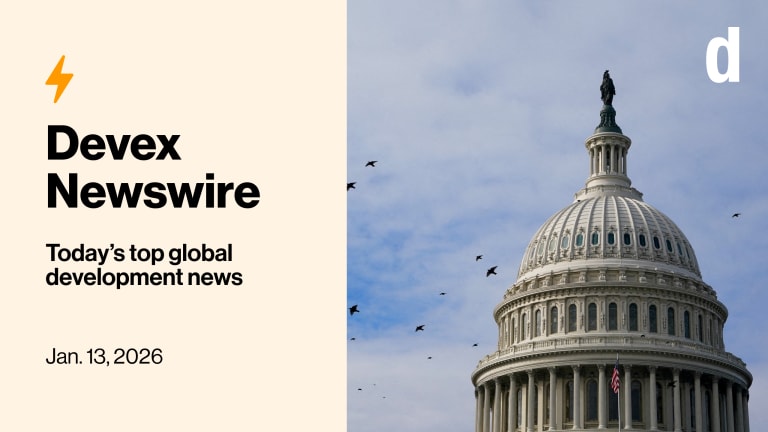Presented by data.org

The high-level meetings of the 80th session of the United Nations General Assembly are upon us this week (much to the chagrin of New York drivers), and we’ve got wall-to-wall UNGA coverage to help you make sense of the barely controlled chaos. In just a few hours, you’ll be receiving one of our special UNGA-dedicated newsletters to give you the lay of the land. And throughout the week, we’ll be bringing you a steady stream of updates from Devex Impact House, where dozens of speakers and sessions will focus on everything from noncommunicable diseases to U.N. reform to artificial intelligence.
But UNGA is not the only game in town. Once just another side event, Climate Week NYC has become a main attraction in its own right. So we’ll kick it off there.
+ Register now to receive all of our on-demand content from Devex Impact House, and expect sharp journalism, bold ideas, and real talk with the people shaping what’s next in global development.
Temperatures flare
Climate change may be a nonstarter for the Trump administration, but activists and scientists haven’t taken their feet off the gas pedal as they pressure the rest of the world to live up to previously agreed climate commitments — a pressure campaign that will be out in full force this week in New York.
Except the specifics of those commitments are largely MIA at the moment.
This year, all countries that signed the Paris Agreement are required to submit their new climate pledges. These nationally determined contributions, or NDCs, must be sent every five years to demonstrate each country’s commitments to help the world stick to the goal of keeping warming below 1.5 degrees Celsius.
Usually, NDCs are submitted long before UNGA, but this year, only 36 out of 197 countries have published their NDCs, writes my colleague Jesse Chase-Lubitz, who will be at Climate Week. Still missing from the list are some of the world’s biggest emitters, including India, Saudi Arabia, the European Union, and Indonesia.
A high-level meeting of 40 heads of state on Sept. 24, when each leader will give a preview of their country’s NDCs, will be the first window into the missing commitments.
“This is an important moment,” Marcos Neto, assistant administrator at the U.N. Development Programme, tells Jesse.
He’s not especially worried about the number of NDCs still to be submitted — pointing out that there has been a consensus throughout the U.N. that “quality and ambition is more important than doing it in a hurry” and that so far the NDCs submitted are “fundamentally a better set of NDCs.”
Those that have already been sent in, he says, are “better, more ambitious, more investible. They take cost into account, and are far more whole-of-society than before.”
Read: All eyes on missing NDCs as Climate Week and UNGA converge
Forced reform
Back to UNGA (expect to hear that a lot this week). An overarching theme will be reforming the U.N. itself, motivated in no small part by U.S. President Donald Trump’s budget cuts, which have forced the U.N. to slash its own budget, fire staff, and consolidate agencies, as my colleague Colum Lynch has been detailing for months.
Trump’s fingerprints on the process have engendered deep skepticism among U.N. staffers and experts, who claim the reforms are a hasty cost-cutting exercise rather than a carefully thought-out blueprint for making the U.N. more relevant.
“I have no doubt there’s a lot of efficiencies to be had, and people should be brave and try to tackle it,” Elizabeth Campbell, the executive director of ODI Global Washington, told Colum during a recent Devex Pro Briefing with Richard Gowan, the U.N. and multilateral diplomacy director at the International Crisis Group. “I am highly skeptical that the U.N. itself can effectively pursue that kind of reform. I don’t really see it able to do it,” Campbell said.
For his part, Gowan argues that U.N. Secretary-General António Guterres’ consolidation project has been hindered by internal bureaucratic resistance, a lack of clarity in U.S. plans for the U.N., and a dwindling timetable as Guterres enters his final year as head of the world body.
“When you talk to diplomats, most of them will say: Yeah, we support UN80. This needs to happen just to keep the ship afloat, but we’re going to wait for the next person, whoever she is, or whoever he is, and we’re going to see if we can find a new secretary-general who will have the time and the political capital to really drive a much bigger strategic review of where the U.N. is going.”
Read: Can the UN really reform itself? (Pro)
+ Elevate your development work. Begin your 15-day free trial of Devex Pro and instantly access our comprehensive suite of resources: expert analysis, insider briefings, extensive funding databases, and curated event listings. Check out all the exclusive content designed to keep you ahead.
Fine line
When does sexual education for teenagers cross the line? What is that imaginary line anyway? Who draws it and who has the power to erase it?
There are no easy answers, but it’s a constant battle of wills in today’s culture wars. One of those confrontations is playing out at UNICEF, which scrubbed its website of guides meant to help teenagers navigate their bodies and relationships, after a conservative U.S. advocacy group accused the agency of pushing “sexually explicit programs targeting children.”
For the Center for Family and Human Rights, or C-Fam, UNICEF’s sexual education publications normalized LGBTQ+ relationships, promoted masturbation, and encouraged girls to explore their anatomy, among other things.
For some UNICEF staff, it was critical information that’s now been censored — setting a worrying precedent.
“What do children and young people want and need? That should be the core of what we do — a lot of what was taken down had been designed and discussed with them and with their caretakers,” a staffer tells my colleague Ayenat Mersie.
But Lisa Correnti, C-Fam’s executive vice president, tells Ayenat that taking down web pages did not amount to a win: “The removal of its public-facing material cannot be regarded as a success if the agency continues to promote the same controversial issues and materials in a less visible manner.”
Read: UNICEF scrubs sex ed pages targeted by US conservative group
All-nighter
Back in Washington, D.C., lawmakers in the U.S. Congress have been engaged in their own pitched political battles. One notable debate that the development community kept a close eye on was the reauthorization of the U.S. Department of State, which is managing the foreign assistance portfolio it inherited from the U.S. Agency for International Development.
After a nearly 36-hour marathon session, the House Foreign Affairs Committee passed a set of bills that would not only reauthorize the State Department, but also put in place a new organizational structure and set of policies, including how it would focus foreign assistance — assuming the bills become law.
That’s a long way away. Historically, State Department reauthorizations have been a bear, so getting this latest one out of committee is merely a first step. The full House still needs to approve it. Then the Senate will have its own proposal, which would have to be reconciled with the House version and then approved again by both houses of Congress. Then it heads to Trump’s desk.
Still, the nascent bills offer a useful window into what foreign assistance might look like in its new home. Among other things, they would create an undersecretary for foreign assistance, a director, and an Office of Foreign Assistance Oversight.
Republicans cheered — and pushed through — the passage, while Democrats booed it.
On the overall restructuring of the State Department, Rep. Chris Smith, a Republican from New Jersey, said, “The administration has already showed this model delivers faster, more effective assistance while strengthening U.S. credibility abroad.”
But Rep. Gregory Meeks of New York, the top Democrat on the committee, criticized the bills for “rubber-stamping the Trump administration’s illegal action to shutter USAID.”
The partisan divide mirrors the larger schism over federal spending, which will consume both chambers over the next few weeks, so don’t expect the reauthorization to be a priority, especially as the U.S. government careens toward a shutdown if no budget deal is reached by Sept. 30.
Read: House committee approves State Department restructure in marathon hearing
ICYMI: US lawmakers propose sweeping State Department reforms
In other news
More than 150 lawyers, human rights advocates, environmental and refugee NGOs in the United Kingdom say they have been “pressured into silence” by far-right and anti-migrant protesters and have urged responsible media reporting on migration to stem rising hostility. [The Guardian]
U.N. chief António Guterres has called for a ceasefire in Darfur, Sudan, amid a “rapidly deteriorating situation” in the region after a drone strike killed more than 70 worshippers at a mosque in el-Fasher on Friday. [Al Jazeera]
Mass evacuations are underway in the Philippines as the country braces for a super typhoon. [BBC]
Sign up to Newswire for an inside look at the biggest stories in global development.








